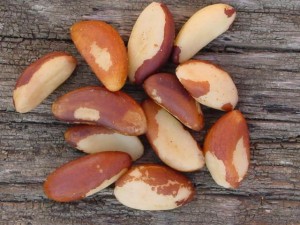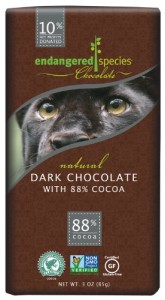Aid Your Weight Loss Efforts and Help the Rainforest…Really!
If you find yourself veering off the road to healthy weight loss, you might want to take a look at your snacks. Skipping a snack or eating the wrong one could be the culprit leading you off track. Have you ever found yourself ravenously hungry between lunch and dinner only to end up overdoing it at your evening meal? Or perhaps you are so hungry, you stop at the vending machine and choose something less than optimal? These are common occurrences. Choosing a snack that is both nutrient dense and delicious is key to supplying your body and spirit with something substantive to help you get from meal to meal. I recently interviewed Kim Barnouin, co-author of the best-selling weight loss Skinny Bitch book series for Healthy Living magazine. She told me that she strongly advocates always having a healthy snack on hand in order to avoid the snack food/vending machine temptation that trips up so many of us despite our good weight-loss intentions.
I have a couple snacks for you that are nutrient-dense enough to satisfy hunger and naturally sweet enough to satiate your sweet tooth. In addition to providing fantastic nutrients for your body, they also help save rainforests giving you two things to feel good about! Incorporating them into your food plan might make the difference between failure and success in your weight-loss efforts.
Brazil Nut Bananza Snack
• 3-4 Brazil nuts
• 1 ripe Rainforest Alliance Certified or organic banana
Sounds simple enough. But why Brazil nuts you may ask? Brazil nuts are rich in selenium, copper, magnesium, fiber, vitamin E, amino acids, and essential fatty acids. They are one of the few nuts to have enough amino acids to make a complete protein (important to vegans and hungry dieters). The fiber adds to a feeling of fullness, and selenium is a powerful antioxidant that is believed to help protect against breast and prostate cancer. One Brazil nut contains 780 percent of the U.S. selenium recommended daily allowance!
Brazil nuts are not only good for your body, buying them and eating them helps the planet as well. Brazil nut trees have a unique distinction that makes them important to the preservation of the Amazon rainforest — they flourish only in the Amazon’s untouched rainforest. Growing Brazil nut trees is quite difficult. Cultivation requires a particular species of bee as well as unique soil-content characteristics. Accordingly, attempts to cultivate Brazil nut trees on plantations have largely failed with only a few exceptions. Basically, if you want to harvest Brazil nuts, you can only do it in healthy tropical Amazon rainforest. That’s the great news. A thriving Brazil nut trade keeps significant areas of the Amazon rainforest intact! In fact, Brazil nuts are considered the most viable non-timber forest product (NTFP) in the Amazon, and they are the only wild-harvested tree nut in the world.
Add bananas to Brazil nuts, and you have yourself a super snack. A great source of carbohydrates, bananas are rich in vitamin C, vitamin B6, potassium, magnesium and fiber. They essentially offer a great package of natural energy, minerals, vitamins, and fiber and are easy to take on the run. Both potassium and magnesium support healthy blood pressure levels. And bananas are the one fruit the delivers on vitamin B6 — a single banana provides 30 percent of the U.S. recommended daily amount. The banana’s natural sugar is tempered by the protein in the Brazil nuts. Combined, they are a winning combo that will supply steady energy to your body until your next meal.
However, to be good to the earth in addition to your body, you must select carefully. Banana cultivation has had a problematic history of environmental degradation and social issues. While conditions have improved dramatically, environmental and social concerns persist. The problem is that bananas grown in tropical regions are extremely vulnerable to disease and pests and require large amounts of pesticides. The solid waste is enormous, not to mention soil erosion, runoff and risks to workers and locals who live near plantations. Every banana farm/plantation was at one time primary tropical rainforest, although most of the deforestation occurred in the past. Common practices such as the use of herbicides containing carcinogenic compounds threaten drinking water quality. Dangerous and risky practices such as overloading soil with nematicides, for example, have been protested in Costa Rican courts by concerned workers.
So when choosing a banana for your healthy snack, choose ones that are grown with as little impact on the environment as possible including better working conditions for plantation farm workers. Look for Rainforest Alliance Certified bananas (most Chiquita and Dole brand bananas are certified), EARTH or Whole Trade bananas at Whole Foods, or organic bananas. If you choose these bananas, you are helping to make sustainable banana production practices profitable, and the entire industry will begin to improve their practices. It’s already happening.
Cocoa Nut Snack
• 3-4 Brazil nuts
• ½ Rainforest Alliance Certified or fair trade, shade-grown organic dark chocolate bar (70 percent cacao or greater)
Yes, you can enjoy chocolate as part of a healthy weight loss plan! The catch is that it has to be dark chocolate with a high cocoa content and it must be eaten in moderation. The bitter sweetness and fiber in dark chocolate will satisfy and provide satiety, while also giving your body a healthy dose of flavanols. Flavanols are antioxidants that have potential benefits for vascular health such as lowering blood pressure, improving blood flow to the brain and heart, and making blood platelets better able to clot. Flavanols are also associated with lowering the “bad” LDL cholesterol and an overall lower risk of heart disease. Pretty good, huh?
Well, it gets better when you add in the choice of rainforest friendly chocolate. Shade-grown, fair trade, organic, Rainforest Alliance Certified — these are the words a rainforest lover looks for when choosing dark chocolate. And here’s why. For hundreds of years, cacao (the plant from which we get cocoa) was grown under the shade of native canopy trees in a landscape similar to natural forest. But to meet increasing world demand, new cocoa varieties have been introduced to grow in full sun, which means clearing rainforests and destroying the native shaded habitat.
Sun-grown cocoa may produce higher yields, but it has come at a high price to workers and the environment. These hybrid sun-grown varieties are extremely vulnerable to pests and disease, requiring the heavy application of agrochemicals. Farmers sometimes resort to using some of the most toxic pesticides, including lindane, a cousin of DDT, which poses health and environmental risks. Additionally, growing cocoa in open fields supports less biodiversity and leads to increased erosion and runoff, soil fertility loss, water contamination and health problems.
To grasp the enormity of deforestation, lets look at one of the world’s top cocoa-producing countries, Côte d’Ivoire. In 1960, the country boasted 12 million hectares of rainforest. Today, just 50 years later, roughly 2.6 million hectares remain! Cocoa plantations have contributed to nearly 14 percent of the deforestation in the country. Neighboring cocoa-producing countries have similar stories of deforestation.
But it’s not just the trees. Cocoa cultivation is rampant with social issues. Smallholder farmers lack access to viable markets and are limited to selling their cocoa to middlemen for only a portion of its value, keeping them in a cycle of poverty. What’s worse is that cultivating a sun-grown cocoa monoculture makes farmers extremely vulnerable to price fluctuations in the market. The average cocoa worker makes barely enough to meet the most basic living needs. The trade is fraught with labor abuses, particularly in West Africa, where forced child and slave labor exists. Yes, that’s slave labor in the 21st century! And despite the Harkin-Engel Protocol, an agreement that major chocolate manufacturers signed in 2001 committing to eradicating such labor abuses in their supply chain, not enough has changed according to the International Labor Rights Forum.
When you buy dark chocolate for your healthy snack, you can help rainforests and workers too by choosing brands that are more sustainably grown and that provide a fair wage to workers. Look for any or all of the following certifications on the packaging: shade grown; fair trade; organic; Rainforest Alliance Certified. You can easily find vegan dark chocolate, too. Some terrific brands that offer dark chocolate that is sustainably cultivated are Endangered Species, Newman’s Own Organics, Theo, and Green & Blacks.
Enjoy your sweet, sensuous snacks and savor every bite knowing you are giving good love to your body and the planet!



